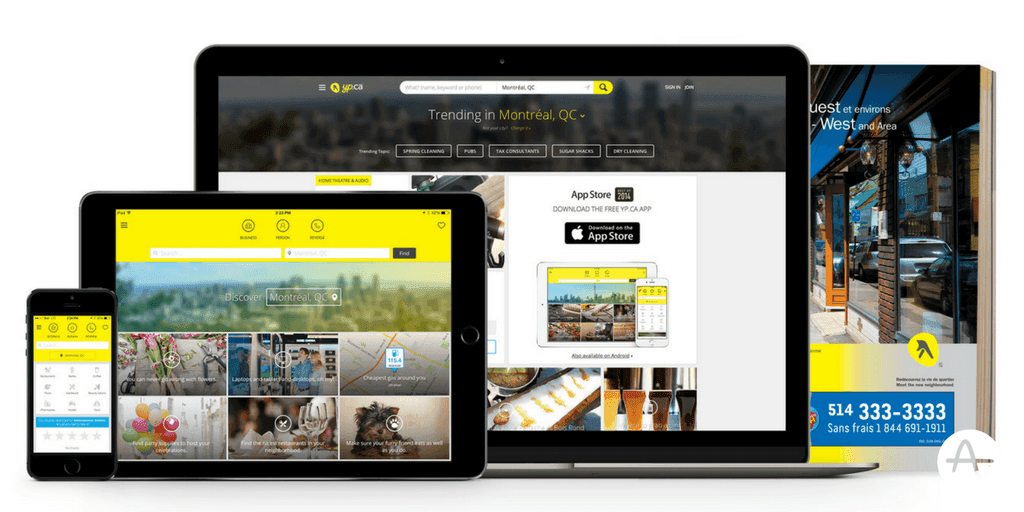Yellow Pages is Undergoing a Digital Transformation
To understand how the Montreal-based public company of 2,900 employees has turned into a successful, digital-first brand, you have to understand what they’ve done differently on the back-end.
As a 100 year old company, how do you reinvent and transform yourself to stay relevant in the digital world? Yellow Pages (YP) has been answering this for years. The company that was once synonymous with print directories is now much, much more than that. Visit yp.ca and you’ll see a sleek search bar, colorful buttons to download a Yellow Pages-built dining, shopping or real estate app. You’ll see the result and why they’re a great example of digital transformation. But that’s just the front-end. To understand how the Montreal-based public company of 2,900 employees has turned into a successful, digital-first brand, you have to understand what they’ve done differently on the back-end. [ “What we’ve done is put the product owners in charge of their own data,” said Alex Métier, manager of the digital analytics team at YP. “Product owners are in charge of defining their own analytics requirements. If they are releasing a new feature or improvement, they are thinking about what events they want to track and the behavior of their users.” Work like defining KPIs or checking day-to-day metrics used to be a bottleneck since Alex and his team of digital analysts held the keys to the data castle. When YP switched to Amplitude as their product analytics platform, they adopted a decentralized, pod structure to product development. All product teams now function in parallel with Alex and Digital Analyst, Salma Tabatabaee at the center to provide support, best practice and training to everyone.

“Amplitude is a game changer at YP because it has completely changed the mindset,” Salma said. “Instead of people bugging us on a daily basis to have basic data, now they have the ability to dive deep into their own data on their own.”
A Complete Data Mindset Shift
Before Amplitude, Salma said product owners saw analytics as a necessary but painful part of their job. Understanding data was not easy or intuitive. It was constraining and cumbersome. Alex remembers the meeting where he and Salma introduced Amplitude as the new product analytics platform. “Guys, we’ve selected a new product to change your lives so implement it, test it, and trust us,” he announced to the team.
Read More Amplitude Case Studies
Since then, all product teams have started using Amplitude to track day-to-day product metrics in their various YP apps. Alex said he’s excited that POs are starting to ask more advanced questions and call on the data analysts to discuss interesting cases that enrich the team’s thinking. “We’re providing deeper insights instead of just data puking for our teams,” he added.
Creating Data Autonomy and Literacy
Yellow Pages did a fresh implementation of Amplitude on a brand new app with all new event taxonomy. So when folks from the Amplitude Customer Success team flew to Montreal to give a training session, they were able to train with YP’s actual data set. “It was a mind-blowing session for our people,” Alex said. “For the first time, developers, QA people, product owners and growth hackers were very excited about the possibilities of the data because they understood it. They were enthusiastic to go deeper.”

Salma and Alex are a shared resource between the many different product squads, small teams comprised of a product owner, growth hacker, and QA. Salma and Alex are there to define best practices for data collection, help product owners understand how to define the right taxonomies, event properties and product requirements. But the squads are autonomous, making independent decisions based on what they’re seeing in Amplitude, releasing a new version of products every 2-4 weeks based on what they’ve learned. “Our key objective for this year is to make sure every product owner manages their backlog based on decisions they can make with data,” Alex said. “This is why it was so important for us to partner with an analytics solution that can give easy access to data.”
Download this case study as a PDF
Sign Up for the Amplitude Blog Newsletter
Get a roundup of articles about building better products delivered to your inbox once a week.

Cara Harshman
Former Managing Editor, Amplitude
Cara was formerly the Managing Editor at Amplitude. Before joining this crew of super-passionate, smart individuals, she wrote and spoke a lot about A/B testing and personalization at Optimizely. She has spoken at MozCon, CTA Conference, Opticon, and Learn Inbound.
More from Cara




